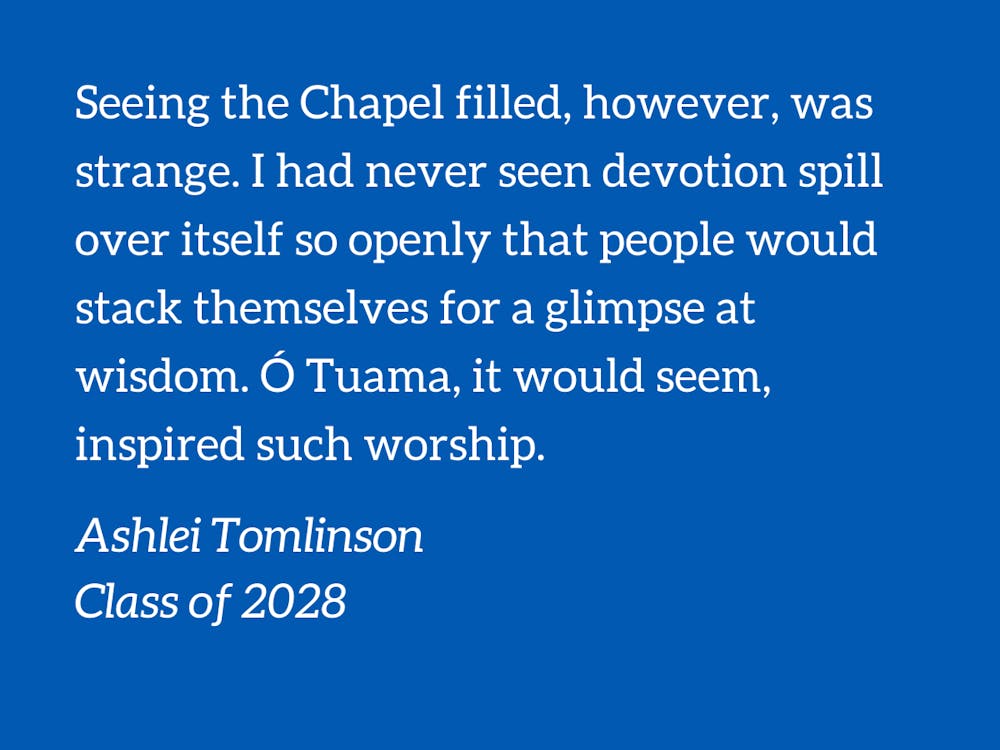At Duke, it is easy to become lost in a room where many compete to be the loudest or most astute. Not only do you feel relegated to the corners of the class, but you may lose out on the essence of a lecture or, in my case, the beauty of Pádraig Ó Tuama’s poetry last semester inside Duke Chapel.
It had been some time since I sat in a church, but the familiarity of that November evening last semester did not escape me. Before me, as always, sat a beloved speaker and a willing audience. Promising to embrace me, too, were breathtaking words of guilt and affirmation. But this was no regular church service: it was a public conversation and poetry reading by Pádraig Ó Tuama.
The reading attracted hundreds of guests, filling the Chapel’s many pews. Such demand was not unusual for Ó Tuama, considering the popularity of his "Poetry Unbound" podcast and the acclaim of his poetry. Seeing the Chapel filled, however, was strange. I had never seen devotion spill over itself so openly that people would stack themselves for a glimpse at wisdom. Ó Tuama, it would seem, inspired such worship.
Left and right, I saw a sea of believers nodding their heads and humming their assent. Their meditation soon pulled me in, bringing me to also nod and hum. For what exactly? I am not quite sure. His words, to me, were white noise drowned out by the sea of humming. They were beautiful words, I imagine, the same as I suspect Beowulf is spectacular even though I have not read it. It occurs to me now, though, that since I had not heard him, others, especially those around me, must have also not heard him. Yet their gestures were, by far, the most insistent.
Two middle-aged men, clad in tweed jackets and elbow patches, particularly come to mind. They sat in the pew directly in front of me, nodding and humming in unison, riding the wave of the Chapel. After a while, they began to comment as well, small anecdotes here and there, one man always following the next. When they were not commenting, they were leaning forward, again, one after another. It seemed terribly convenient that each man would express rapture in the same manner and timing. I suppose they could have been so in tune with each other that such mirroring was natural. Looking around me, though, it appeared that others, too, were walking that line between engagement and effrontery.
Admittedly, there was no shortage of genuine awe that evening. Ó Tuama was spellbinding, even for me, who hardly caught every word. Amid Ó Tuama’s oeuvre, however, was a battle of the cultured: supposed poetry enthusiasts, vying, no matter what, to be the most enthused. But was this so surprising? This was Duke after all: home of the bloviator.
At Duke, education often seems performative. Most students, if not all, vie to be the best among the best. In every casual reunion or chat before class, there is the student who "abashedly" announces they are taking organic chemistry, only to be topped by someone who is not only taken "orgo" but multiple courses like it, and that one to be topped by someone whose major or track is unbelievably hard (insert BME, pre-med, pre-law, etc.). Ask those students, however, one material thing about those classes or disciplines, and very few have a ready answer. That is not to say they do not know the material, but that their knowledge is immaterial to education. It matters more to effect higher learning than to embody it.
Many at Duke seem to have perfected this ensemble. And, like the poetry goers, compete in their performance of knowledge. But what happens to those who have not? Those who feel morally opposed to or, more likely, too shy to act the expert? To the women in S.T.E.M. classes who feel they have no voice in male-dominated fields? They fall behind. They become the silent spectator in a Chapel of poetry savants, mimicking those around them to — someway, somehow — not feel left out.
Ashlei Tomlinson is a Trinity first-year.
Get The Chronicle straight to your inbox
Sign up for our weekly newsletter. Cancel at any time.

